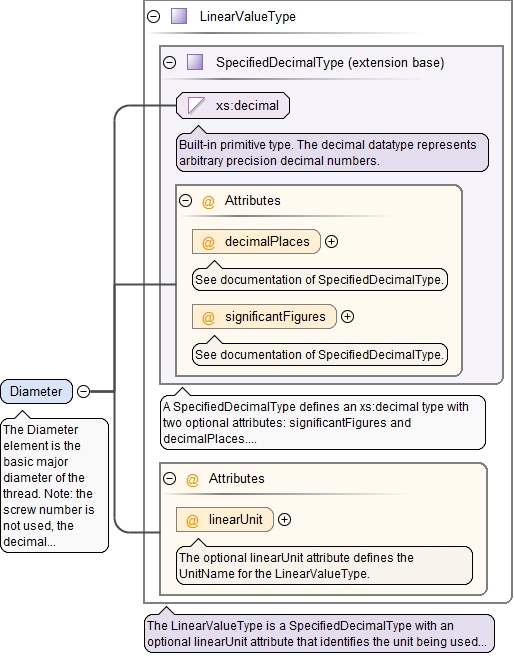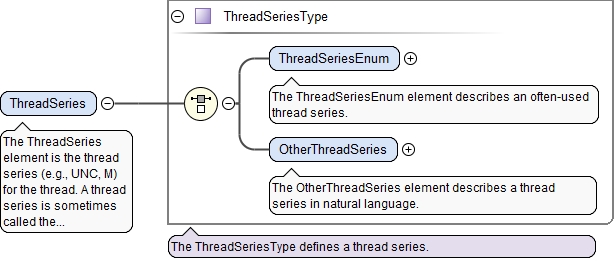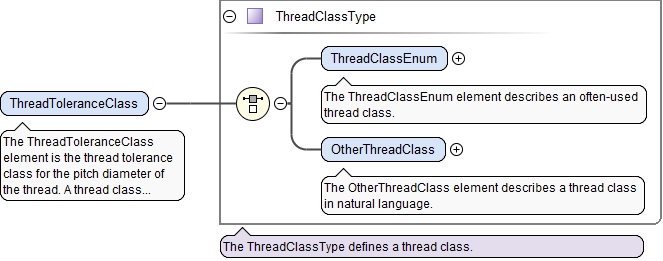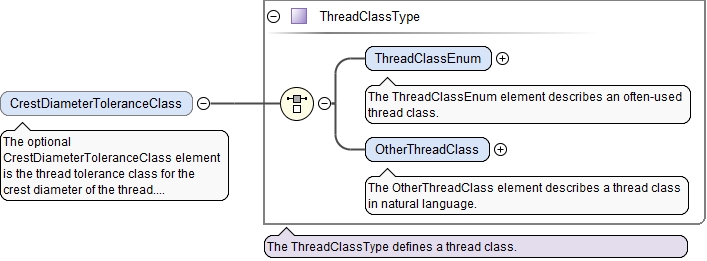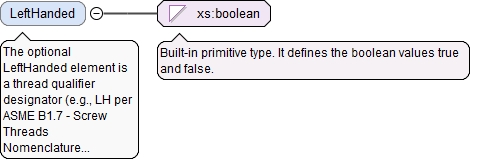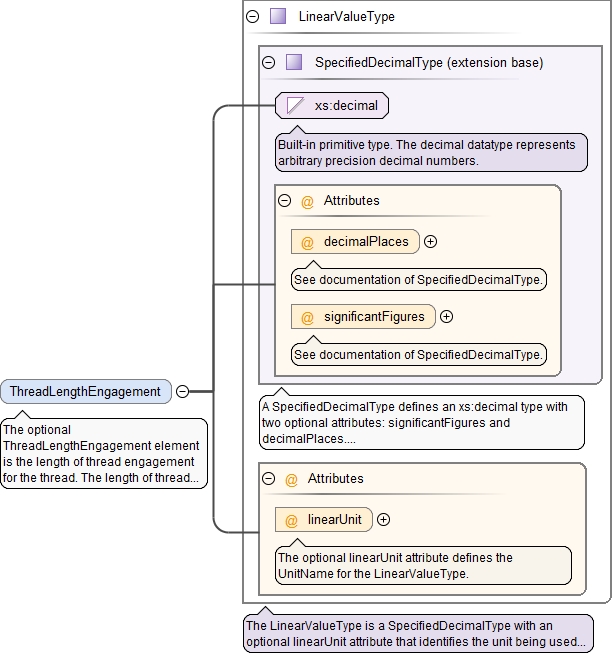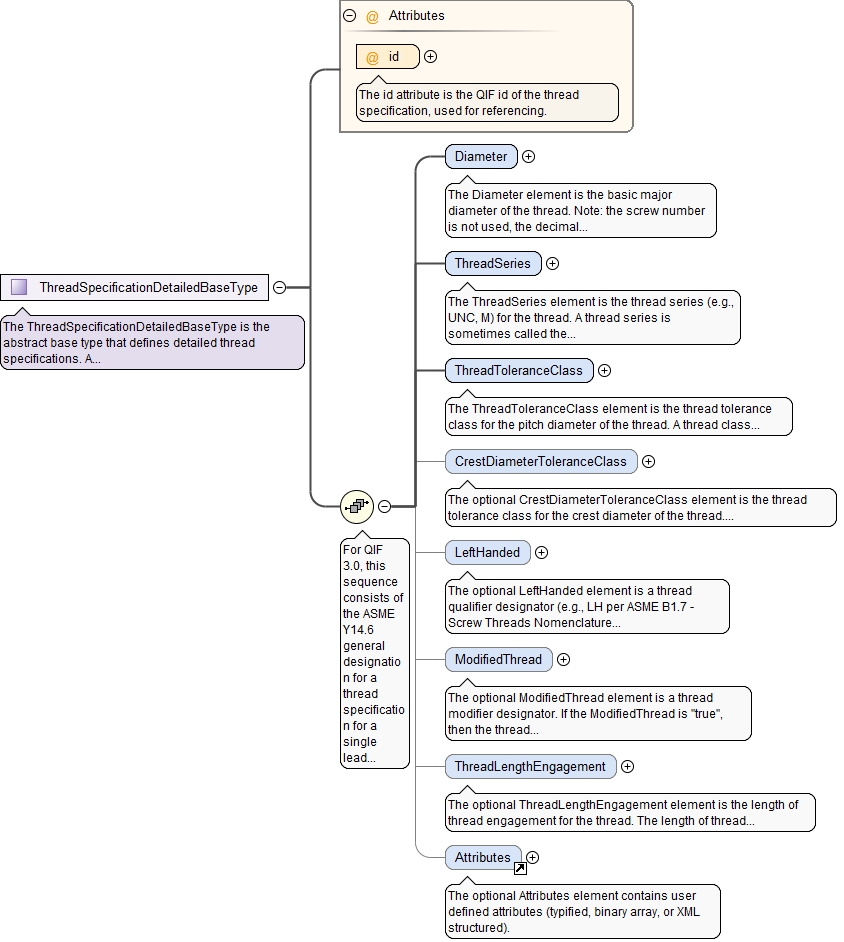<xs:complexType name="ThreadSpecificationDetailedBaseType" abstract="true">
<xs:annotation>
<xs:documentation>The ThreadSpecificationDetailedBaseType is the abstract base type that defines detailed thread specifications. A detailed thread specification has elements defining each aspect of the thread in contrast to a simple thread specification string.</xs:documentation>
</xs:annotation>
<xs:sequence>
<xs:annotation>
<xs:documentation>For QIF 3.0, this sequence consists of the ASME Y14.6 general designation for a thread specification for a single lead and multi-lead thread. The base type includes nominal diameter, thread form/series (e.g., UNC, UNF), thread tolerance class (pitch diameter and crest diameter), whether the thread is left-handed or right-handed, modified thread, and length of engagement. Future QIF versions may include additional thread specification elements.</xs:documentation>
</xs:annotation>
<xs:element name="Diameter" type="LinearValueType">
<xs:annotation>
<xs:documentation>The Diameter element is the basic major diameter of the thread. Note: the screw number is not used, the decimal equivalent for the screw number will be used (e.g., #10 screw number is equivalent to .190 inch).</xs:documentation>
</xs:annotation>
</xs:element>
<xs:element name="ThreadSeries" type="ThreadSeriesType">
<xs:annotation>
<xs:documentation>The ThreadSeries element is the thread series (e.g., UNC, M) for the thread. A thread series is sometimes called the thread form.</xs:documentation>
</xs:annotation>
</xs:element>
<xs:element name="ThreadToleranceClass" type="ThreadClassType">
<xs:annotation>
<xs:documentation>The ThreadToleranceClass element is the thread tolerance class for the pitch diameter of the thread. A thread class designation indicates the standard grade of tolerance and allowance specified for a thread -- typically a numeric class symbol and an internal and external character (e.g., 2A, 2B, 4h). For metric threads (e.g., M, MJ) the ThreadToleranceClass (e.g., 4g, 6H) indicates the combination of a tolerance grade (numeric) with a tolerance position (e.g., e, f, g, h, G, H) and specifies the allowance for the pitch diameter tolerance.</xs:documentation>
</xs:annotation>
</xs:element>
<xs:element name="CrestDiameterToleranceClass" type="ThreadClassType" minOccurs="0">
<xs:annotation>
<xs:documentation>The optional CrestDiameterToleranceClass element is the thread tolerance class for the crest diameter of the thread. The crest diameter is the major or minor diameter dependent upon if the thread is external or internal. The diameter tolerance class designation (e.g., 6g) indicates the combination of a tolerance grade (numeric) with a tolerance position (e.g., e, f, g, h, G, H). It specifies the allowance for the crest diameter tolerance.</xs:documentation>
</xs:annotation>
</xs:element>
<xs:element name="LeftHanded" type="xs:boolean" minOccurs="0">
<xs:annotation>
<xs:documentation>The optional LeftHanded element is a thread qualifier designator (e.g., LH per ASME B1.7 - Screw Threads Nomenclature Definitions and Letter Symbols and ASME Y14.6 - Screw Thread Representation) indicating a thread that is screwed in or on counterclockwise. If the LeftHanded element is present and set to "true", the thread is left handed. Otherwise, the thread is right handed.</xs:documentation>
</xs:annotation>
</xs:element>
<xs:element name="ModifiedThread" type="xs:boolean" minOccurs="0">
<xs:annotation>
<xs:documentation>The optional ModifiedThread element is a thread modifier designator. If the ModifiedThread is "true", then the thread has a modifier designate. Otherwise, there is no modifier designated.</xs:documentation>
</xs:annotation>
</xs:element>
<xs:element name="ThreadLengthEngagement" type="LinearValueType" minOccurs="0">
<xs:annotation>
<xs:documentation>The optional ThreadLengthEngagement element is the length of thread engagement for the thread. The length of thread engagement is the axial distance over which two mating threads, each having full form at both crest and root, are designated to engage. The length of thread engagement is designated by LE.</xs:documentation>
</xs:annotation>
</xs:element>
<xs:element ref="Attributes" minOccurs="0">
<xs:annotation>
<xs:documentation>The optional Attributes element contains user defined attributes (typified, binary array, or XML structured).</xs:documentation>
</xs:annotation>
</xs:element>
</xs:sequence>
<xs:attribute name="id" type="QIFIdType" use="required">
<xs:annotation>
<xs:documentation>The id attribute is the QIF id of the thread specification, used for referencing.</xs:documentation>
</xs:annotation>
</xs:attribute>
</xs:complexType> |
